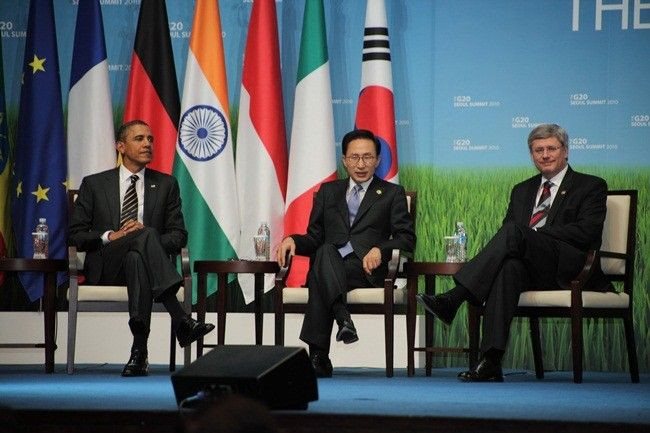How to interpret G20?

How much was accomplished at the just-concluded G20 summit in Seoul, South Korea likely depends upon whom you are asking. While some observers feel the summit cannot really do anything to address the fundamental differences between diametrically opposed economies (see: U.S. vs. China), others feel that progress of any such summit has to be measured in slow, patient doses.
“This meeting of the G-20 reminded me of some the quarrelsome family reunions I attended as a child,” said Sean Snaith, director, Institute for Economic Competitiveness, College of Business Administration at the University of Central Florida
“Lots of name-calling, bickering and finger-pointing but despite the bad feelings everyone showed up for the next year’s reunion.”
Thus, Snaith thinks any perceived “lack of accomplishment” in Seoul has to be taken in the same context.
“As long as the arguments over the ‘beggar-thy-neighbor’ policies of the U.S. (QE2) do not lead to trade wars and the G20 continues to work on these issues, then progress can been made,” he said.
“These meetings are part of an ongoing dialogue and relationship between the members of the G-20 who are dealing with problems that lay at the intersection of international finance, international trade and politics. Finding consensus on these issues such as how to handle the tremendous trade imbalances is difficult. Finding solutions to these problems will take time and is made more difficult with the expanded number of countries.”
Indeed, even the British Prime Minister, David Cameron, a great supporter of the G20 summits, conceded that perhaps these meetings were no longer in their “heroic phase,” suggesting perhaps that they were not as impactful as in 2008 during the onset of the global crisis.
Snaith thinks the G-20 is still relevant as long as it does not continue to expand beyond the point where achieving consensus is problematic.
“Globalization necessitates cooperation between the economies of the world and as long as it exists we need to have organizations like the G-20 working to smooth out problems along the way,” he explained.
Mark Tepper, managing partner of Strategic Wealth Partners in Seven Hills, Ohio, takes a decidedly more pessimistic view of the whole G20 show.
“The G20 Summit was more style than substance,” he said.
“The biggest failure of the G20 is that we’re hearing the same old story; albeit in different words. There is a commitment to ‘move toward more market-determined exchange rate systems and enhance exchange rate flexibility to reflect underlying economic fundamentals and refrain from competitive devaluation of currencies.’ However, China has made hollow commitments in the past to allow this to happen. Additionally, the US denies that it is actively seeking to weaken the dollar in the first place. So, all of the verbiage might be for naught.”
Tepper adds that while the US is trying to propose current account ceilings of 4 percent of GDP in order to help rebalance the global economy, not much is going to happen without tangible commitments from the major surplus countries.
“This is yet another example of how the G20 hasn’t really changed anything,” he stated.
“The inconclusive G20 Summit probably takes us a step closer to a global trade war.”
Tepper also believes that no progress was made with regards to the China – US currency war.
He admits that the statement “G20 members will refrain from introducing, and oppose protectionist trade actions in all forms and recognize the importance of a prompt conclusion of the Doha negotiations” is reassuring.
However, he warns that this statement does not preclude a trade war from breaking out if the U.S. economy remains sluggish with high unemployment and China moves too slowly.
Thus, the efficacy and relevance of G20 remains subject to wide interpretations. For example, some contend the parley prevented a currency war, others claim that it actually has ignited one.
It will be interesting to see of G20 elicits such varied opinions when it meets again next year in France.
© Copyright IBTimes 2025. All rights reserved.





















